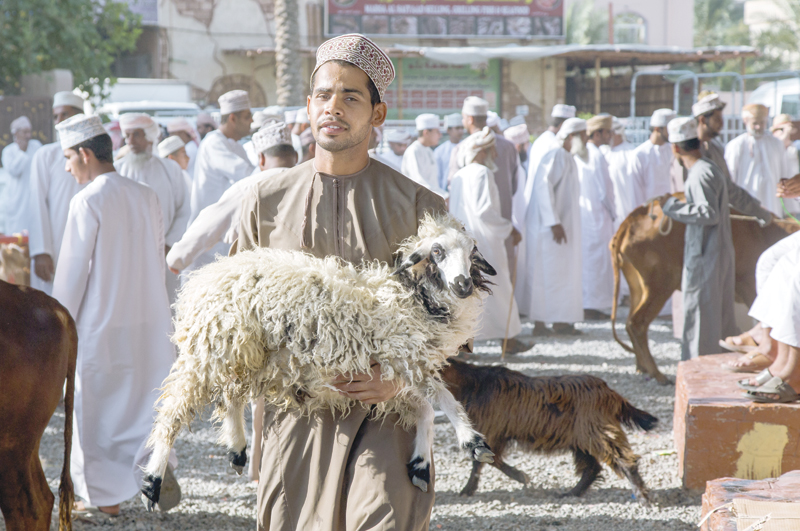

It is nine in the morning and the sun pours heat intensely over the earth. But Wadi Kabir habta market is abuzz with excitement. Herds of goats and sheep were on display and men — both natives and foreigners are busy bargaining to strike the best deal. At one corner was a group of spectators forming around two men in dishdashas with traditional sticks vividly explaining about the quality of their goats. “There is a greater demand for domestic goats especially during festivals,” murmured my Omani friend Faizal, who accompanied me to the market, even though I did not mean to buy one, but he did.





Higher demand for home grown goats means they can be offered at higher prices ranging from RO 200 to RO 300, while most imported breeds sell for less.
“Negotiating with the traders is not easy. They don’t easily agree to bring down the prices,” Faizal said.
In the meantime, the shouting continued for a while. Judging from the two men’s intermittent laughs I realised that they were not arguing but merely negotiating the price.
But soon those two shook hands and slapped each other’s backs. Money exchanged hands and the second man slapped the goat on its rump and made it jump. The goat was untied from his rope and dragged by his one horn towards the waiting car.
The pure-blooded Omani goat on the bargain was quietly chewing on the greens suspended in bunches from a rope above its head brought from home. Little did it know that its journey to Wadi Kabir market was not part of a picnic — but the preparations for Eid al Fitr.
According to Faizal, markets like Wadi Kabir provide great opportunity to buy the Omani breed of sheep and cows. They also provide stockbreeders with the opportunity to sell their cattle at good prices.
The habta market is a legacy that has been handed down to successive generations and is one of the oldest Omani traditions observed to celebrate Eid. They bring in social and economic returns and Omanis visit them in the last days during Ramadhan to prepare for Eid and to make their purchases.
Although the public markets in the Sultanate are crowded with the advent of Eid al Fitr, where stockbreeders display their animals, the known habta markets usually start on the 24th day of the holy month of Ramadhan and continue for several days.
Habta markets are traditional markets that are held on the occasion of Eid al Fitr and Eid al Adha in the open or under the shade of palm, mango, or Ghaf trees, or near castles and forts. Such markets witness a large turnout of citizens, residents, and tourists.
These markets are a great opportunity to buy the Omani breed of sheep and cows. They also provide stockbreeders with the opportunity to sell their cattle at good prices.
But what worried both sellers and buyers at the market was the rising prices.
“This year they are more expensive,” said Saleh, a merchant who had a herd of about 10 Omani goats and sheeps.
He said that maintaining a livestock farm carries with it great expenses, and the purpose of increasing prices is to balance the expenses of these farms.
Ibrahim, a buyer who came to the market with his children said, “The prices are too high when one considers buying more than one goat”.
The habta markets witness a large turnout of visitors from early morning. People visit these markets from various villages wearing traditional Omani dress, and carrying daggers and sticks. Some people come from the nearby wilayats as the market is packed with local sheep and cows.
• Photos by Upendra Nayak
Oman Observer is now on the WhatsApp channel. Click here



